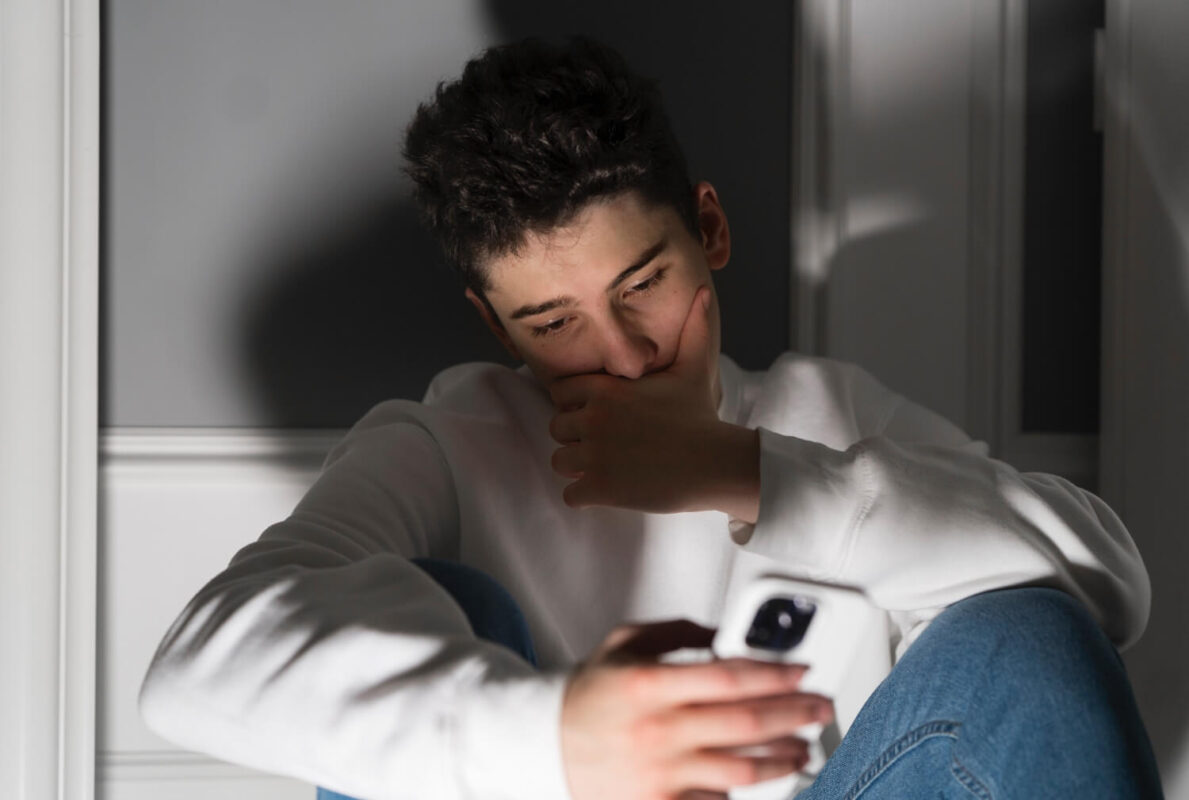The rise of social media addiction is a growing concern in our society. With the ever-increasing presence of technology in our lives, it is becoming increasingly difficult to disconnect from our devices and take a break from the digital world. Social media addiction is a real problem that can have serious consequences on our mental and physical health. It can lead to feelings of isolation, depression, and anxiety, as well as physical health issues such as sleep deprivation, headaches, and fatigue. It is important to recognize the signs of social media addiction and take steps to address it. At Omega Recovery, we understand the importance of taking a break from technology and the need to be mindful of our digital habits. We strive to provide our customers with the tools and resources they need to manage their social media addiction and lead a healthier, more balanced lifestyle. Our goal is to help our customers find a healthy balance between their digital and physical lives.
What is Social Media Addiction?
Social media addiction is a growing problem in our society. It’s estimated that over half of all adults in the United States are addicted to social media, and the numbers are only increasing. Social media addiction is defined as an excessive use of social media platforms, such as Facebook, Twitter, Instagram, and Snapchat, that leads to negative consequences in a person’s life. People who are addicted to social media often find themselves spending hours scrolling through their feeds, checking notifications, and engaging in online conversations. This can lead to a decrease in productivity, an increase in stress, and a decrease in overall well-being. At the same time, social media addiction can also lead to a decrease in physical activity, an increase in isolation, and a decrease in meaningful relationships. People who are addicted to social media often find themselves spending more time online than with their friends and family. This can lead to feelings of loneliness and depression, as well as a decrease in self-esteem. It’s important to recognize the signs of social media addiction and take steps to address it. If you find yourself spending too much time on social media, it’s important to take a break and focus on other activities. Additionally, it’s important to reach out to friends and family for support and to seek professional help if needed. With the right help and support, it is possible to overcome social media addiction and lead a healthier, more balanced life.
The Dangers of Social Media Addiction
As the world becomes increasingly connected through social media, it is important to be aware of the potential dangers of social media addiction. Social media addiction is a real phenomenon that can have serious consequences for individuals and society as a whole. It can lead to a decrease in productivity, an increase in anxiety and depression, and a decrease in physical activity. It can also lead to a decrease in face-to-face social interaction, which can have a negative impact on relationships. At the same time, it is important to recognize that social media can be a powerful tool for connecting with others and staying informed. It can be a great way to stay in touch with friends and family, and to stay up-to-date on current events. However, it is important to be mindful of how much time is spent on social media and to be aware of the potential risks associated with overuse. Taking breaks from social media, setting limits on usage, and engaging in other activities can help to reduce the risk of social media addiction.
Signs of Social Media Addiction
As the world becomes increasingly connected through social media, it is important to be aware of the signs of social media addiction. Social media addiction is a real phenomenon that can have serious consequences for individuals and their relationships. Signs of social media addiction include spending excessive amounts of time on social media, feeling anxious or irritable when not using social media, and neglecting other activities or relationships in favor of social media. If you or someone you know is exhibiting these signs, it is important to take action. There are many resources available to help those struggling with social media addiction, including online support groups, counseling, and even apps that can help you manage your social media usage. Taking the time to recognize the signs of social media addiction and seek help can make a huge difference in your life.
How to Recognize Addiction in Loved Ones
As the use of social media continues to rise, so does the prevalence of social media addiction. It can be difficult to recognize when a loved one is struggling with an addiction to social media, but there are some tell-tale signs that can help you identify if someone you care about is in need of help. One of the most common signs of social media addiction is an obsession with checking their accounts. If your loved one is constantly checking their phone or computer for updates, or if they are spending an excessive amount of time on social media, it could be a sign of addiction. Additionally, if they are constantly comparing themselves to others on social media, or if they are using social media as a way to escape from reality, it could be a sign of an unhealthy relationship with social media. If you think your loved one may be struggling with social media addiction, it is important to reach out and offer your support. Talk to them about their usage and encourage them to take a break from social media. Additionally, there are many resources available to help those struggling with social media addiction, so be sure to research and find the best option for your loved one.
How to Overcome Addiction From Social Media
Social media addiction is a growing problem in our society. With the rise of technology, it’s becoming increasingly difficult to disconnect from our devices and take a break from the constant bombardment of notifications and updates. It’s easy to get caught up in the endless cycle of scrolling, liking, and commenting, but it’s important to remember that there is a real world outside of our screens. It’s important to recognize the signs of social media addiction and take steps to address it. If you find yourself constantly checking your phone, feeling anxious when you’re not connected, or feeling like you need to be online to stay in the loop, it’s time to take a step back and reassess your relationship with social media. Taking a break from social media can help you to reconnect with yourself and the people around you. It can also help to reduce stress and anxiety, and give you more time to focus on the things that really matter. If you’re struggling with social media addiction, it’s important to remember that you’re not alone. There are many resources available to help you manage your addiction and take back control of your life. With the right support and guidance, you can overcome social media addiction and reclaim your life.

Omega Recovery: Helping You Overcome Your Addiction
The rise of social media addiction has become a major issue in today’s society. With the ease of access to social media platforms, it’s no surprise that people are becoming increasingly addicted to their devices. Social media addiction can lead to a variety of negative consequences, such as decreased productivity, increased stress, and even depression. Fortunately, there is help available. Omega Recovery is a leading provider of social media addiction treatment, offering a comprehensive program to help individuals overcome their addiction. Through a combination of counseling, support groups, and lifestyle changes, Omega Recovery can help you break free from the cycle of social media addiction and reclaim your life. With their caring and experienced team, you can find the support and guidance you need to make lasting changes and take back control of your life.
Social media is causing us to lose our sanity for a multitude of reasons. These include the damaging impact of comparing ourselves to others, cyber-bullying, increased sedentary behavior leading to depression, and the creation of a superficial sense of identity based on fleeting “likes”. Moreover, the illusion of having “friends” on digital platforms who are not truly there for us further exacerbates the anti-social nature of social media.
Also known as “Anti-Social Media,” research suggests that having more “friends” on social media platforms like Facebook, Instagram, Twitter, and Snapchat is associated with having fewer in-person friends. Unfortunately, numerous studies indicate that having a larger number of social media friends is linked to higher rates of depression. Surprisingly, more digital friends can lead to more depression. Moreover, there is an increased incidence of cyberbullying and self-harm, including higher rates of suicide. It’s evident that social media isn’t as wonderful as it may seem.
Omega Recovery, led by Dr. Nicholas Kardaras, a leading authority on social media addiction treatment and author of the best-selling book “Glow Kids,” offers an immersive 8-week program. This program not only focuses on social media addiction but also addresses underlying issues that contribute to the addiction. Many social media addicts face challenges such as self-esteem issues, depression, anxiety, substance use, low resilience, shame, and trauma. Often, they struggle to find genuine purpose and meaning in their lives.
Social media addiction is a growing problem that can have serious consequences for individuals and their loved ones. It is important to be aware of the signs of social media addiction and to take steps to recognize and address it in yourself or a loved one. Omega Recovery is a great resource for those looking for help in overcoming social media addiction. With the right support and guidance, it is possible to break free from the cycle of addiction and lead a healthier, more balanced life. Take the first step today and reach out to Omega Recovery for help in overcoming social media addiction. Give us a call at (512) 601-5407 or visit our website at www.omegarecovery.org.




